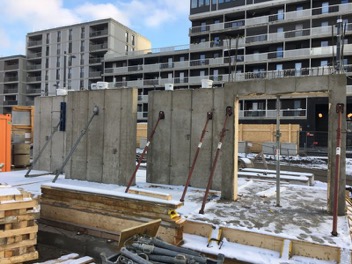RCC – Reduced Carbon Concrete
Client: Federal Ministry for Climate Protection (City of Tomorrow) and City of Vienna
Cooperation partners: Wopfinger Transportbeton Ges.m.b.H., STRABAG Real Estate (SRE), Materialprüfanstalt Hartl, DI Dr. Johannes Horvath - Sachverständiger Betontechnologie, Dr. Ronald Mischek ZT, bauXund GmbH
Processing period: 2019-2021
Concrete and cement production are of considerable environmental relevance; at the same time, concrete is by far the most widely used building material worldwide. Austria has an annual cement consumption of 5.2 million tons and emits approximately 2.9 million tons of CO2 per year for its production (MAUSCHITZ, 2020, p. 7, 7a). Decarbonization of the construction industry is a global issue. The present project is intended to make a contribution to this.
The research objective is the use of "performance concrete" as CO2 -reduced concrete (RCC - "reduced carbon concrete") with a lower cement content. In contrast to conventional concretes, the technical equivalence has to be proven by the technical properties ("performance"). The basis, in addition to ÖNORM B 4710-1, is the future ONR 23339 "Rules for the implementation of the concept of equivalent concrete performance". This standard will set the framework, how to compensate the delayed early strength development of RCC concrete by suitable curing measures at the construction site.
In two series of tests, structural elements designed according to the RCC concept with a 25% reduction of CO2 were compared with conventionally designed structural elements of the same design. This empirical research under practical conditions on a construction site under summer and winter temperatures and in a precast concrete plant aimed at practical findings on the "real crete" and not on the "lab crete".
The report on the entire research project was published in the publication series of the Federal Ministry for Climate Protection and made accessible electronically via the platform www.NachhaltigWirtschaften.at.

